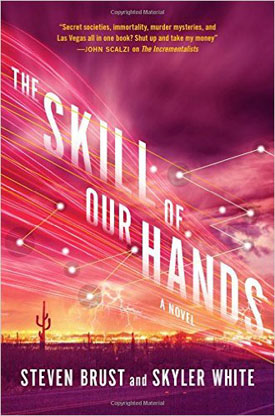 Call it “slipstream”: it’s not exactly science fiction, although it could be; nor is it fantasy, although it has elements of that, in the gritty, contemporary, urban vein; and anything it takes from mainstream fiction is more from the realm of Pynchon than Hemingway. I’m referring, of course, to The Skill of Our Hands, the sequel to The Incrementalists from Steven Brust and Skyler White. (An aside: if you’re not familiar with the previous book, I suggest you read the review here for some background. It will help.)
Call it “slipstream”: it’s not exactly science fiction, although it could be; nor is it fantasy, although it has elements of that, in the gritty, contemporary, urban vein; and anything it takes from mainstream fiction is more from the realm of Pynchon than Hemingway. I’m referring, of course, to The Skill of Our Hands, the sequel to The Incrementalists from Steven Brust and Skyler White. (An aside: if you’re not familiar with the previous book, I suggest you read the review here for some background. It will help.)
Once again, the story focuses on Phil and Ren, although Phil has been murdered – “assassinated” is probably a more accurate way of putting it: three shots to the heart, from the back, a marksman’s work – and the main story is centered on getting him back – finding his stub and finding a suitable Second. As for the latter, the Salt – Oskar, Jimmy, Irina, Ramon, Ren, and Kate operating long distance – comes up with almost too many candidates. And there are almost too many questions to be answered.
For example, why was Phil shot? Well, we’re in Arizona in 2014 – Tucson, to be precise, not exactly Maricopa County but close enough to partake of an anti-immigrant sentiment on the part of law enforcement, some of whom are convinced that they are the law and who aren’t too careful about their methods. An undercurrent, although present only by reference, is the Pentagon’s program of handing out military equipment to local police forces for the asking. What could go wrong? That’s what Phil was working against when he was shot.
There is, of course, another wrinkle: there is a loose group of – call them “the resistance” — working against the authoritarianism of the police by less than open means – sabotage, mostly. Calling themselves the “Hourlies,” they’re aided and abetted – and coordinated – by Sam, a local teacher, and his lieutenant, Frio. Sam’s wife, Jane, has befriended Ren, and thus we have a connection.
Now, throw in Phil, Ren, and Irina, all working to change this but not working together and not being completely open – or even a little bit – with each other.
The story is related by Oskar as an anonymous third person, with asides as himself. And, like The Incrementalists, it is a subtle, circumspect, elliptical kind of tale: not much is up front, and there’s a great deal of the story – not the bare events, but the personalities, the context, the histories – that comes by inference. (I remarked to a friend – a bookseller, as it happens – that a huge portion of the book happens underneath the words. That’s the best way I can think of to describe it.) Oskar assumes we know more than we do, as far as the context of the Incrementalists and their history and methods are concerned, but it does come out, on a sort of need-to-know basis, seldom that plainly stated.
There is a second story, occasional short chapters interspersed throughout the main narrative, of Phil’s work in Kansas in the 1850s, in the midst of the “debate,” to put it in the mildest possible terms, on whether Kansas would join the Union as a slave or free state. Phil was working to defuse the violence, as much as he could, with a particular focus on John Brown. Yes, that John Brown. There’s a resonance between then and now, again inferred more that stated, but it’s there.
As I noted in regard to its predecessor, those who like their stories laid out plainly, with everything clearly stated, are going to hate this book. Those of us who regard reading as other than a spectator sport are, more than likely, going to be enchanted.
(Tor Books, 2017)
